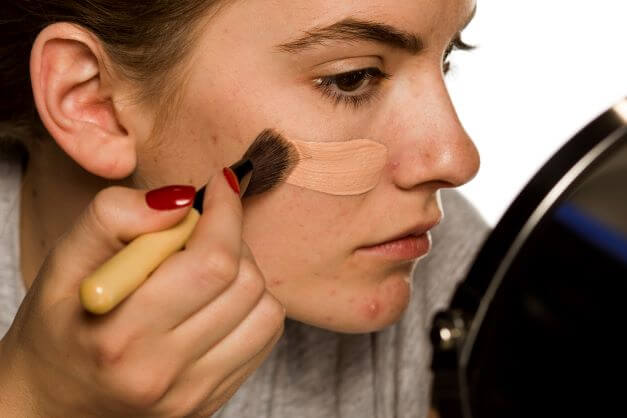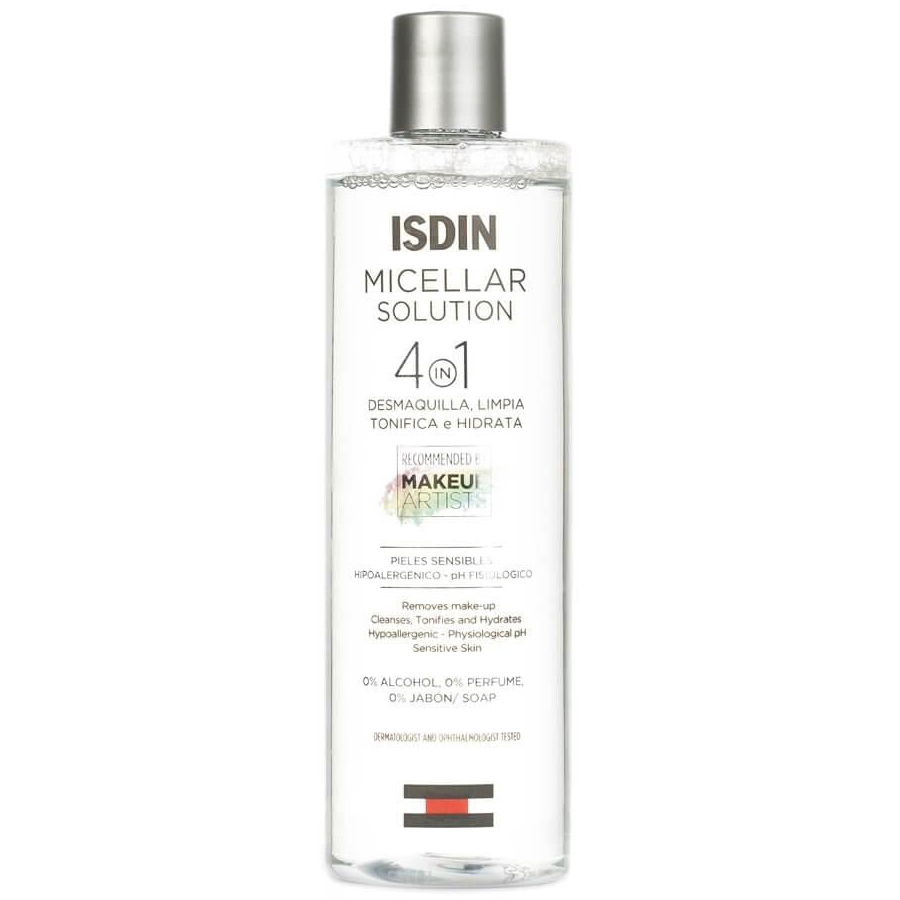For many people who struggle with acne, makeup is one way they can diminish the impact of breakouts on their appearance and allow them to feel more confident even during acne breakouts. However, for some people, makeup may be contributing to acne breakouts, prolonging them, or even causing them. According to Dr. Mahsa Karavan of U.S. Dermatology Partners in Plano, Texas, “While makeup isn’t always a bad thing and doesn’t necessarily cause all forms of acne, people who struggle with acneic skin are significantly more likely to develop a unique form of acne called acne cosmetica, which is acne caused by using certain cosmetic products. This type of acne typically occurs when certain types of makeup contribute to skin irritation and inflammation that can clog pores and lead to breakouts.” In this blog, Dr. Karavan will discuss what acne is, how makeup can cause acne breakouts, and the best steps patients can take to keep skin looking and feeling great.
What Is Acne?
Acne is a chronic skin condition that occurs when the pores become clogged with oils, dead skin cells, cosmetics, skincare products, and other sources of grime, dirt, and oil. These clogged pores are often called blemishes, pimples, or zits. Almost everyone will have pimples at some point in their lifetime. In most cases, blemishes are not referred to as acne unless they are more severe, widespread, or chronic. Often, acne is also characterized by inflammation and/or infection caused by bacteria on the skin being trapped inside the clogged pores. This leads to deep, severe pimples that can be more difficult to treat.
How Does Makeup Cause Acne Breakouts?
A specific form of acne, acne cosmetica, is linked to breakouts after using makeup and other cosmetic products. This type of acne most often causes clusters of small pimples where cosmetics are applied. Breakouts may center around the mouth, forehead, chin, and nose. Acne cosmetica occurs when makeup products either contribute to pores becoming clogged or further irritate skin during an acne breakout. According to Dr. Karavan, “It can be difficult for people to pinpoint acne cosmetica. This type of acne can take days or weeks to appear after using a new makeup. For this reason, people don’t necessarily connect the acne breakout with wearing makeup. Additionally, many people who experience acne cosmetica breakouts already struggle with acne-prone skin. People can struggle for years to manage their acne breakouts only to find out that their makeup routine is the cause of many acne flare-ups.”
Are There Makeup Options that Don’t Cause Acne Breakouts?
According to Dr. Karavan, “Everyone’s skin responds differently to cosmetics. However, finding makeup that is labeled as non-comedogenic is always a good start. People may experience acne breakouts while using these products, but these non-comedogenic makeup products are significantly less likely to be the direct cause of acne breakouts. Additionally, many cosmetics options are specifically geared toward keeping acne-prone skin clear. Specifically, I often recommend patients with acneic skin use foundations that contain salicylic acid. Foundation can be one of the biggest contributors to acne cosmetica breakouts. Using foundation brands that contain salicylic acid provides the look patients are seeking while minimizing the risk for breakouts. Salicylic acid is a mild exfoliant ingredient found in many acne treatments, so using foundations with this ingredient is a great option for many people with acneic skin.”
In addition to looking for non-comedogenic skincare and cosmetics products, people with acne-prone skin should also avoid cosmetics that include ingredients like myristyl myristate, laureth-4, isopropyl myristate, silicones, and sodium lauryl sulfate. When it comes to these ingredients, Dr. Karavan says, “Honestly, these ingredients aren’t good for anyone’s skin. They can be irritating and lead to unnecessary inflammation. If you see these ingredients on your cosmetics, you may want to look into other options.”
Can I Prevent Makeup-Related Acne Breakouts?
According to Dr. Karavan, “Finding the right makeup products for acneic skin is a great first step toward preventing makeup-related acne breakouts, but there’s more to it than simply changing to non-comedogenic makeup. If you want to continue using cosmetics, you may also need to adjust your daily skincare routine, make sure you’re keeping makeup application brushes clean, and are using the right treatments to manage your acne.”
Specifically, taking the following steps can help to prevent cosmetics-related acne breakouts:
- Update your cleansing routine – Clean skin twice a day with a mild facial cleanser. Look for oil-free and non-comedogenic facial cleansers. In the morning, simply wash your skin. After wearing cosmetics all day, remove the makeup thoroughly but gently using an oil-free makeup remover before cleansing the skin.
ISDIN Micellar Solution
- Incorporate mild pore cleansing and oil-reducing ingredients such as lactic acid, salicylic acid, and glycolic acid in form of serum or toner. Ask your dermatologist if you have sensitive skin and are unsure which ingredients are best for you. ISDIN Micellar Solution gently removes impurities and makeup without altering the skin’s natural barrier.
- Be aware of fragrances or essential oils in your products. For those with sensitive skin, fragrance ingredients can cause inflammation that could worsen acne, in general fragrances do not have any tangible benefit for our skin.
- Use exfoliants correctly – You don’t want to over-exfoliate and irritate the skin, but exfoliation is an important part of keeping pores clear. Using a gentle exfoliant a few times each week for those with more sensitive skin or once a day for those who can tolerate it, will remove dead skin cells to reduce the chances of clogging pores. Avoid exfoliant products that use beads or rough particles, the micro-trauma from beads can irritate the skin and lead to more acne.
- Keep skin hydrated – It may seem counterintuitive but using moisturizer is important to prevent acne breakouts. When the skin isn’t hydrated, it produces additional sebum (oil) to maintain adequate moisture. Using a moisturizer in the morning and evening can prevent acne breakouts.
- Clean your makeup brushes – Bacteria can grow in makeup brushes and contribute to acne breakups, especially deep, infected, and inflamed blemishes. It’s important to clean your brushes at least once a week and replace the brushes regularly when you notice signs of wear and tear or if the brushes are no longer coming clean.
- Stay on top of acne treatments – Make sure to use all acne treatments as directed by your dermatologist. Even when skin isn’t broken out, it’s important to continue any treatments to manage acne symptoms and prevent clogged pores.
Want to Work with a Dermatologist to Address Acne?
Many people with mild to moderate acne can manage acne breakouts entirely with over-the-counter skincare products and lifestyle changes. However, dermatologists can help you better understand the ways that acne impacts your skin, adjust your skincare routine, and generally help you to improve your skin health. If you’re interested in working with a dermatologist to better manage acne or receive more advanced acne treatments, don’t hesitate to get in touch with the U.S. Dermatology Partners location near your home or office by completing our simple, online scheduling request form.
Find a location near me
or



